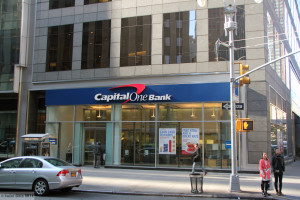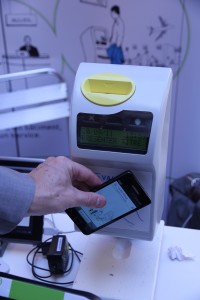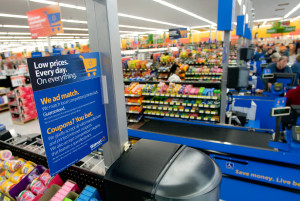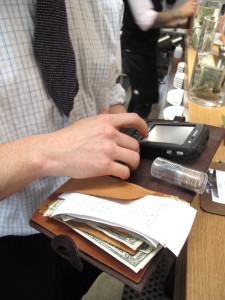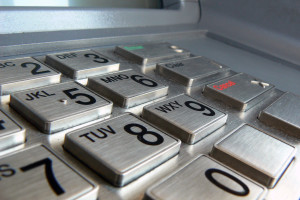April 18th, 2014 by Elma Jane
Capital One joins existing stakeholders equally owned by Bank of America, JPMorgan Chase, and Wells Fargo. Member-owner of the ClearXchange network.
Capital One has taken a stake in ClearXchange, the US bank-backed clearing house for person-to-person online payments transfer.
ClearXchange is the first network in the U.S. created by banks that lets customers send and receive (P2P) person-to-person payments easily and securely using an email address or mobile number.
With only the recipient’s mobile number or email address, the ClearXchange network enables customers to send funds directly from their bank account to the recipient’s bank account without the need to pass on more sensitive account information.
EVP of digital at Capital One, says partnering with clearXchange is another way of bringing safe and secure payments through convenient, digital channels to their customers.
With membership open to banks and credit unions of all sizes, ClearXchange has so far signed up only FirstBank as its sole non-owner participant, although it nonetheless claims to represent more than 50 percent of the consumer online banking market.
Posted in Credit card Processing, Electronic Payments, Merchant Services Account, Mobile Payments, Payment Card Industry PCI Security, Small Business Improvement, Smartphone, Visa MasterCard American Express Tagged with: account, bank account, Bank of America, Capital One, consumer online banking, digital channels, JP Morgan, market, mobile, online payments transfer, p2p, payments, person-to-person, secure payments, securely, U.S. Bank, US Bank, Wells Fargo
April 11th, 2014 by Elma Jane
A new standard that uses Host Card Emulation (HCE) was introduced by VISA to enable financial institutions to securely host Visa accounts in the cloud. Visa’s move to support HCE includes tools and services as well as the standard. It is available now and will include support for QR codes and in-app payments in the future.
With this new service and platform that Visa is developing, it will enable clients and partners to issue Visa accounts digitally in the cloud, on secure elements in smartphones, or linked to a digital wallet. The solution will also enable the issuance of payment tokens that will replace the 16-digit payment account number and can be limited for use with a specific device, merchant or payment channel.
Layers of security will deploy by Visa to protect payment accounts in the cloud, including at the Visa network, application and hardware levels. Device fingerprinting technology, one-time use data, payment tokens and real-time transaction analysis will make up a multi-layered defense against unauthorized account access for their services.
Visa has intensified its Visa PayWave contactless payment application and is introducing a new implementation guidelines, program approval process standard and requirements for their standards.
Visa is also developing a tool, its software development kit (SDK) to support clients who wish to develop their own cloud-based payment applications or want to enhance their existing mobile banking applications with Visa PayWave functionality.
HCE is introduced to make it easier for developers to create NFC applications like mobile payments, loyalty programs, transit passes, and other custom services. Visa’s move to enable NFC payments with Android devices is welcome news and will guide the way for the payments industry.
Clients and partners around the globe are continuously looking for cost efficient, flexible and secure ways to enable mobile payments. The Android HCE feature provides with a platform to evolve the Visa PayWave standard, support the development of secure, cloud-based mobile applications, while at the same time offer greater choice.
Posted in Best Practices for Merchants, Credit card Processing, Credit Card Security, Electronic Payments, Financial Services, Merchant Services Account, Mobile Payments, Mobile Point of Sale, Near Field Communication, Smartphone Tagged with: accounts, android devices, approval, cloud, cloud-based mobile applications, contactless payment, device fingerprinting, Digital Wallet, digitally, financial institutions, HCE, host card emulation, in-app, mobile banking, nfc, payment account number, payment channel, payment tokens, payments, qr codes, real-time transaction, secure elements, securely, Smartphones, unauthorized, visa, visa network
December 30th, 2013 by Elma Jane
MasterCard and Green Dot today announced an expanded relationship that allows all U.S. cardholders with MasterCard rePower -enabled prepaid cards to reload their cards via the Walmart Rapid Reload service.
Walmart Rapid Reload utilizes the Green Dot Network to provide cardholders with a fast and easy way to load funds directly to their cards by swiping their cards at any register at participating Walmart stores (not available in VT or WY). Cardholders can add funds directly to their prepaid account by using cash or a pre-printed payroll or government check. Cashier-added funds will be available for use by MasterCard rePower-enabled cardholders within minutes.
The MasterCard rePower network is open to any MasterCard issuer of reloadable prepaid card programs. Portfolios such as the Univision MasterCard Prepaid Card will be able to offer their cardholders the new cash reload option through Walmart Rapid Reload.
Prepaid products provide consumers with choices in how they manage and spend their money. In order to maximize the potential of prepaid, cardholders need to be able to conveniently and securely reload funds. Our expanded partnership with Green Dot now allows our cardholders to load funds to their prepaid cards at more than 4,000 Walmart stores that offer Walmart’s Rapid Reload service, said MasterCard Group Executive of U.S. Market Development Craig Vosburg.
Posted in Credit card Processing, Electronic Payments, Gift & Loyalty Card Processing, Visa MasterCard American Express Tagged with: cardholders, green dot, MasterCard, network, pre-printed, prepaid cards, rapid reload, register, reloadable, repower, securely, Swiping, univision, walmart
December 5th, 2013 by Elma Jane
Three key benefits mPOS can provide PSPs. mPOS:
1. Maintains A Continuity Of Operations
mPOS solutions also ease the process of accepting and approving payments, according to the white paper. By enabling face-to-face card present transactions, mPOS allows transactions to be conducted in a highly secure manner. Further, once the encrypted transaction data is decrypted securely by the PSP at the payment gateway (with no access granted to the merchant), the onward presentation of the data into the acquiring network is consistent with that used historically for traditional POS terminals.
2. Simplifies Merchant Support
Thales suggests the biggest benefit to PSPs is that mPOS reduces the variety of costs PSPs need to cover to support merchants, cutting expenses related to equipment, security and PCI DSS compliance. This, the white paper says, allows PSPs that utilize mPOS to better allocate resources toward handling higher transaction volumes and acquiring business.
3. Supports Both Magnetic Stripe and EMV Cards
Another benefit to PSPs is that mPOS, despite its recent entrance to the market, is already widely available. The white paper explains that since the mPOS revolution quickly migrated from the U.S. abroad, mPOS solutions now exist to serve the unique needs of both markets. While this means challenges for merchants operating globally, PSPs benefit from being able to address the needs of merchants who want to opt for any and all available market solutions.
Much has been said about the recent explosion of the mobile point-of-sale (mPOS) market and how micromerchants are driving this payments revolution. But, what this story doesn’t communicate effectively is that small merchants aren’t the only stakeholders benefiting from the ongoing mPOS migration.
Payment service providers (PSPs) are another member of the mPOS value chain that can gain flexibility and security through these solutions, new research from data protection solution provider Thales suggests.
“Both merchants and PSPs have operational and logistical issues with traditional POS terminals associated mainly with the highly controlled and certified environment in which they must be used,” Thales writes in its latest white paper on the topic, “mPOS: Secure Mobile Card Acceptance.”
The 27-page white paper provides an extensive overview of the ongoing POS revolution, explaining how mPOS can reduce friction and costs for merchants, illustrating how the technology works step-by-step and highlighting the roles that each stakeholder plays along the value chain.
Posted in Electronic Payments, Mobile Payments, Mobile Point of Sale, Payment Card Industry PCI Security, Point of Sale, Smartphone Tagged with: acceptance, acquiring network, card present, compliance, decrypted, DSS, emv cards, encrypted, face-to-face, magnetic stripe, merchant, micromerchants, migration, mobile card, mobile point of sale, MPOS, payment gateway, payment service providers, payments, PCI, POS, psps, secure, securely, Security, terminals, transactions
October 15th, 2013 by Elma Jane
Banking and payments technology provider FIS and City National Bank, a private and business bank, have partnered to pilot FIS’s Cardless Cash Access at City National ATMs in Los Angeles, New York City and San Francisco. The solution lets consumers stage an ATM transaction from their mobile devices.
City National plans to introduce the emerging technology to clients in its three largest markets early next year, according to an FIS announcement, continuing FIS’ rollout of the solution at banks and ATMs in key U.S. locations.
FIS said Cardless Cash Access securely authenticates a user on his or her smartphone. The consumer then uses the phone to select the account and amount of the withdrawal. At the ATM, the consumer scans a QR code on the ATM screen and, within seconds, the cash is dispensed and an e-receipt is sent to the phone.
Consumers continue to look for innovative new ways to engage with their financial institutions via mobile devices, FIS Mobile, said in the release. At the same time, they demand additional security to keep their information safe. Information from Cardless Cash Access is maintained in the cloud, so card data cannot be accessed if the consumer’s phone is lost or stolen – making this a faster, safer, more secure way to make a withdrawal.”
To decrease fraud, FIS said, security within Cardless Cash Access is provided through the app’s authentication and registration of a user’s smartphone, which the company said eliminates card skimming risk and fraud incidents for banks and their clients.
With the proliferation of debit and access to cash at the point of sale, financial institutions are looking for ways to expand the utility of the ATM,” Senior vice president and head of product strategies, Vince Hruska, City National Bank, said in the release. “Cardless Cash Access not only provides a secure and easy way to obtain cash from an ATM, but introduces to the client a new way of looking at ATM use.
Posted in Financial Services Tagged with: account, amount, atm, authenticates, banking, banks, card, cardless, cash, data, e-receipt, emerging, financial, Mobile Devices, national, payments, QR code, securely, Security, Skimming, smartphone, transaction
